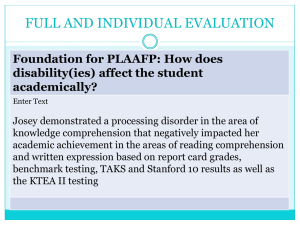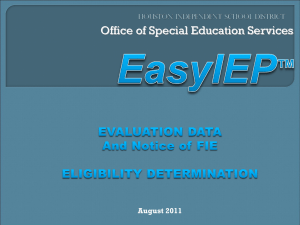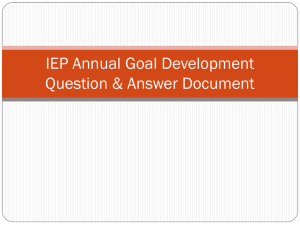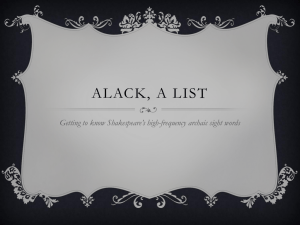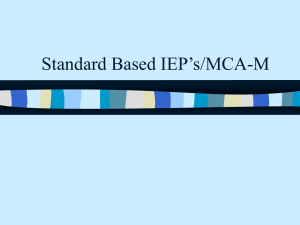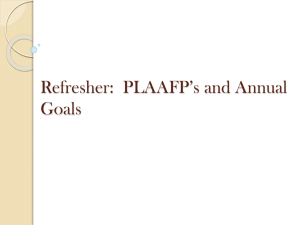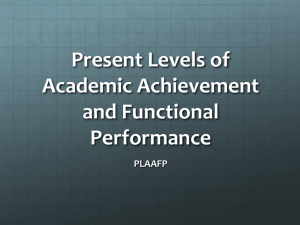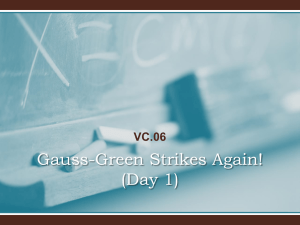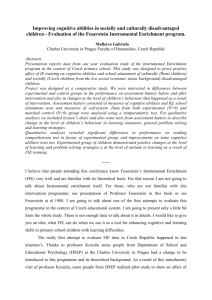Evaluation Summary Examples - HISD Special Education Updates
advertisement
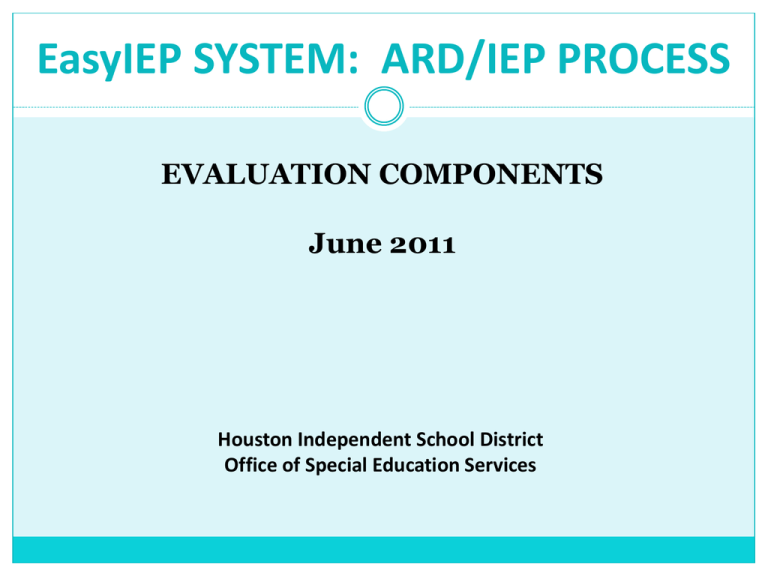
EasyIEP SYSTEM: ARD/IEP PROCESS EVALUATION COMPONENTS June 2011 Houston Independent School District Office of Special Education Services Evaluations and Notice of FIE • This section is completed by the evaluation specialist, LSSP, speech therapist, OT, PT, AI/VI itinerant teacher and etc. • It is important that the staff responsible for evaluations complete the information on this page before the ARD/IEP meeting • The school cannot appropriately develop the PLAAFP or complete the ARD/IEP meeting without this information • Evaluation information should be documented at least 30 days before the ARD/IEP meeting • PEIMS section: Evaluation specialists, LSSPs, and/or speech therapists (for speech only students) will • Respond “Yes” or “No” to whether the student is identified as having a multiple disability • Respond “Yes” or “No” to whether the student is identified as being medically fragile, per TEA/HISD guidelines – consult with the school nurse or nurse consultant • For the FIIE/FIE and Evaluation Components section, the evaluation specialists, LSSPs, speech therapists, OT, PT, AI/VI itinerant teachers and etc. will locate the appropriate field for his or her discipline • Enter a summary of the most current evaluation report in order to assist the campus staff in developing the Student Profile and the PLAAFP. NOTE: The ES, LSSP or SLP (for speech only students) will not enter a summary for any previous FIIE date that may have been imported from Chancery. • Let’s look at the various “Evaluation Components.” The good news is that the evaluation narrative is populated (automatically added) in the deliberations section. Evaluation Summary Site https://go11.pcgeducation.com/txevalhouston FIE & Evaluation Data FULL AND INDIVIDUAL EVALUATION Report: SLD FIE Summary Cognitive area(s) of Foundation for the Cognitive area(s) that PLAAFP weakness is intact/strength FIE Report: MR (ID)/NCEC(MR) FIE Summary The student displays a global cognitive delay based on: Foundation for the PLAAFP Adaptive behavior deficits were identified in the following areas: FIE Report: OHI, OI, TBI, AI, VI, DB, MD FIE Summary Foundation for the PLAAFP Physical Condition - Factors unique to this student’s environment that impact learning are: FIE Integrated Report: ED/AU FIE Summary Completed by Evaluation Specialist Foundation for the PLAAFP Completed by Evaluation Specialist Psychological Evaluation Summary Completed by LSSP Psychological Foundation for the PLAAFP Completed by LSSP FIE Report: SI Only FIE Summary Required for SI only – completed by Speech Therapist Foundation for the PLAAFP Required for SI only – completed by Speech Therapist FIE Integrated Report: SI with Additional Disabilities FIE Summary Completed by Evaluation Specialist Foundation for the PLAAFP Completed by Evaluation Specialist Speech Evaluation Summary Completed by Speech Therapist Speech Foundation for the PLAAFP Completed by Speech Therapist FIE REPORT Evaluation Summary Josey was referred due to difficulty with reading comprehension tasks including identifying setting and plot summary as well as distinguishing between fact and opinion. She writes short statements but has difficulty organizing a paragraph when working independently. Josey met the disability criteria as a student with a specific learning disability (SLD) with a demonstrated processing disorder in the area of knowledge comprehension that negatively impacted her academic achievement in the areas of reading comprehension and written expression. FIE REPORT Foundation for PLAAFP: How does disability(ies) affect the student academically? Josey demonstrated a processing disorder in the area of knowledge comprehension that negatively impacted her academic achievement in the areas of reading comprehension and written expression based on report card grades, benchmark testing, TAKS and Stanford 10 results as well as the KTEA II testing. When provided with decoding support and reading strategies such as Think-PairShare, K-W-L or other graphic organizers, Josey recalls main and supporting characters and details as well as answers factual and inferential comprehension questions on grade level text in the content areas. Josey writes statements appropriately using the conventions of capitalization and ending punctuation. She capitalizes most names and places. However, Josey does not edit presented text for errors in grammar and spelling. Josey writes two or three descriptive statements when given a picture prompt and an outline. She struggles with writing short paragraphs that have a beginning, middle and ending on a given topic. FIE REPORT Cognitive area(s) of weaknesses is: Comprehension-knowledge Cognitive areas that are intact: fluid reasoning, short-term memory, and long-term storage and retrieval FIE REPORT The student displays a global cognitive delay based on: Ricky’s score was more than two standard deviations below the mean on the Full Scale IQ on the WISC-IV. His cognitive profile was relatively flat with significantly delayed scores in Verbal Comprehension, Perceptual Reasoning, Working Memory and Processing Speed. FIE REPORT Adaptive behavior deficits were identified in the following areas: Communication and Daily Living Skills based on the results of Vineland Adaptive Behavior Scales – II, when rated by his mother. FIE REPORT Physical Condition - Factors unique to this student’s environment that impact learning are: Josey has been diagnosed as a student with attention deficit hyperactivity disorder. Her mother reports that she takes Concerta XR in the morning before coming to school. Occasionally, Josey seems sleepy in class just before the last period of the day. Josey has difficulty with concentrating, maintaining attention and organization. She frequently needs reminders to remain on-task until she completes her assignment. Josey responds appropriately when the teacher gives her a nonverbal prompt to work quietly and raise her hand before speaking in class. FIE Report: OHI (ADHD) Emotional/behavior concerns are: Devon continually disrupts the classroom( talks out of turn, intrusive with peer interactions); difficulties with concentration and attending skills – makes careless mistakes, gives up easily, avoids assignments and homework; often restless and easily excited. Has difficulty starting or finishing projects, poor organizational skills. Can be argumentative and has anger issues. Limited social skills with peers, difficulty making and keeping friends. FIE REPORT Emotional/behavior concerns are:* Josey is frequently off-task and speaks out-of-turn, without raising her hand. She rushes through assignments without following directions. *Use this section for any student with relevant emotional/behavioral concerns who does not have a psychological evaluation PSYCHOLOGICAL: ED Evaluation Summary: Francisco’s symptoms of depression and anxiety fall in the clinically significant range across all settings. He has difficulty dealing comfortably and effectively with emotionally arousing situations and he may be more vulnerable to becoming overwhelmed or disorganized when confronted with intense expressions of affect. Francisco often experiences high levels of intrusive ideation due to worry or lack of control over his situation. PSYCHOLOGICAL: ED Psychological Foundation for PLAAFP: How does disability(ies) affect the student academically? High level of distractibility, severe mood swings, isolates self from peers and group activities, engages in self-talk that disturbs peers, easily angered, requires constant redirection, easily annoyed, and poor self-control. PSYCHOLOGICAL: ED Foundation for PLAAFP: How does disability(ies) affect the student academically? Francisco demonstrates sufficient characteristics of anxiety and depression and these symptoms are displayed through a poor self image, lack of interest in pleasurable activities, irritability, worry , sadness, feelings of being a bad person, and inability to change his situation. In the school setting, Francisco often has difficulty concentrating, disrupts classroom instruction, responds with work refusals, or isolates self from peers and group activities. When anxious he will walk out of class, perseverate over issues that cause him anxiety, pace back and forth, and make self-defeating statement. Psychological: AU Evaluation Summary Alicia is rigid to routines, imposes restrictive guidelines about food, and has undeveloped social skills. Although Alicia expresses interest in peer interactions, she often appears disengaged when opportunities for interaction are presented. At time, Alicia will misperceive social situation, causing high levels of anxiety. Additionally, Alicia has difficulty advocating for herself (i.e. requesting help or making needs known). She may require time to recover from these instances before she can successfully rejoin the classroom environment. Alicia lacks the use of spoken speech – uses gestures and pointing. Shows little interest in participating in classroom activities. Is inattentive and uncooperative, requires the use of a picture exchange system for completion of academic activities. Does not use eye contact to engage in social exchanges. Does not respond to her name. Stem with hands and fingers. Psychological: AU Foundation for PLAAFP: How does disability(ies) affect the student academically? Student will need visual schedules, additional time for work completion, accommodations to presentation of work, frequent prompting, reduced assignments and organizational assistance. Allow student to work with a specifically selected peer to facilitate social interaction opportunities and provide a peer model. Practice relaxation strategies to reduce anxiety. Prompt strategies prior to entering into situation that have been historically difficult. Consider using a “help” card to communicate a need for assistance. Psychological (ADHD) Evaluation Summary Devon displays significant levels of inattention, hyperactivity and behavioral inhibition in a variety of settings. It appears that his reported difficulties are not due to an emotional disturbance. Devon behaviors of off-task, impulsive verbal and physical outbursts, defiance, classroom interruptions (humming noises, singing, yelling out in class, excessive talking) and refusals to follow class rules. Devon also displays poorly developed levels of age-appropriate social skills (argues with peers, intrusive with peer’s belongings, poor use of personal space). Psychological (ADHD) Foundation for PLAAFP: How does disability(ies) affect the student academically? Student requires redirections to monitor his behaviors and rewards through the use of a daily behavior chart. Home and school setting should devise a system for immediate feedback and meaningful consequences for behavioral issues. Intersperse low with high appeal activities; touch student on shoulder or arm when praising, reprimanding, or instructing. Schedule the most difficult subject in the morning. Allow for request breaks and opportunities to move around the classroom. Implement the use of a daily behavior chart. Increase positive interaction with a 5 positive to every 1 negative. Need for Additional Evaluation section - Yes Check "Yes," if additional evaluation is being considered by the ARD/IEP committee. Follow the prompts to complete the subsequent questions Reminder: Evaluation representative for the additional evaluation area under discussion will be present at the ARD/IEP meeting to facilitate the discussion with the committee Develop the Notice of FIE and forward “hard copy” to the parent along with the ARD/IEP document OR Need for Additional Evaluation section - No Check “No,” if no additional evaluation is being considered by the ARD/IEP committee Check “No” to the question a Notice of FIE is Required Note: Staff who are not responsible for evaluations will have “View Only” access to this page Continue with specialized training guide presentation
